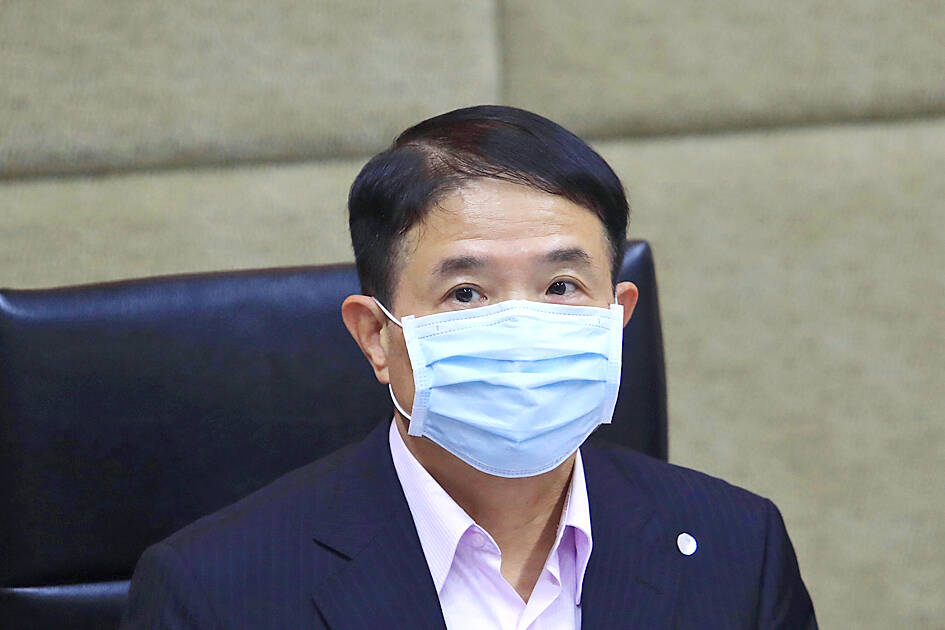The National Communications Commission (NCC) would not intervene in the production and planning of television news coverage of political candidates running in the nine-in-one local elections in November, NCC Vice Chairman Wong Po-tsung (翁柏宗) said yesterday.
Wong was responding to criticism from former Tainan County commissioner and Taiwan Renewal Party Taipei mayoral candidate Su Huan-chih (蘇煥智), who on Monday said that several TV networks were focusing only on the three major candidates in the Taipei mayoral election.
Su said he would sue the networks for contravening the Civil Servants Election and Recall Act (公職人員選舉罷免法), as well as the NCC for failing to supervise the stations.

Photo: CNA
“While TV stations can produce and broadcast programs based on their own broadcasting guidelines and code of ethics, for mayoral elections, they should follow Article 49 of the act during the 15-day campaigning period leading up to the election,” Su said. “We will work with the Central Election Commission to ensure that broadcast media comply with election regulations.”
Under Article 49, TV stations are required to cover political candidates fairly. Broadcast media contravening the article are subject to a fine of between NT$200,000 and NT$2 million (US$6,433 and US$64,334).
Twelve candidates are running for Taipei mayor, with former minister of health and welfare Chen Shih-chung (陳時中) of the Democratic Progressive Party, Chinese Nationalist Party (KMT) Legislator Chiang Wan-an (蔣萬安) and independent candidate Vivian Huang (黃珊珊) among the front-runners.
Su said that Chinese Television System (CTS), Public Television Service, Formosa Television, TVBS and SET News had contravened Article 104 of the act, which prohibits spreading rumors or false information, or attempting to help a candidate win or lose an election.
He said he would today protest outside the CTS building and ask the network to invite him and all Taipei mayoral candidates to a debate.
“Formosa TV told me that it can only invite candidates from major political parties or those with high approval ratings to a televised debate due to the limited time and resources it has,” he said. “However, it is only legal and reasonable if all candidates in the Taipei mayoral election are invited. Inviting all candidates to a debate is feasible, as evidenced by cases in other countries.”
Neither poll results nor party affiliation should be used as justification for deciding which candidates to cover or who to invite for televised debates, he said, adding that it is the discriminatory practices of broadcast media that lead to discrepancies in approval ratings.
In addition to addressing the biases of TV networks, the NCC should quickly stipulate broadcast guidelines for campaign news coverage to ensure the fairness of the election.
Separately, Wong said that Huang’s pledge to establish an online public policy discussion forum if elected could be unconstitutional if it uses a real-name system.
Huang said the online platform would allow Taipei residents to propose policies directly to the city government.
Using a real-name system would ensure that real people participate in discussions on issues facing the city, she said, adding that the forum would not collect personal data.
This helps foster an environment in which people are responsible for their own public statements, she said.
“I suggest that the candidate look at the example in South Korea, where a real-name system was ruled unconstitutional in August 2012,” Wong said. “Adopting a real-name system in an online forum could impede freedom of speech, which was not won easily in Taiwan, and thus requires extensive discussion.”

The Coast Guard Administration (CGA) yesterday said it had deployed patrol vessels to expel a China Coast Guard ship and a Chinese fishing boat near Pratas Island (Dongsha Island, 東沙群島) in the South China Sea. The China Coast Guard vessel was 28 nautical miles (52km) northeast of Pratas at 6:15am on Thursday, approaching the island’s restricted waters, which extend 24 nautical miles from its shoreline, the CGA’s Dongsha-Nansha Branch said in a statement. The Tainan, a 2,000-tonne cutter, was deployed by the CGA to shadow the Chinese ship, which left the area at 2:39pm on Friday, the statement said. At 6:31pm on Friday,

The Chinese People’s Liberation Army Navy’s (PLAN) third aircraft carrier, the Fujian, would pose a steep challenge to Taiwan’s ability to defend itself against a full-scale invasion, a defense expert said yesterday. Institute of National Defense and Security Research analyst Chieh Chung (揭仲) made the comment hours after the PLAN confirmed the carrier recently passed through the Taiwan Strait to conduct “scientific research tests and training missions” in the South China Sea. China has two carriers in operation — the Liaoning and the Shandong — with the Fujian undergoing sea trials. Although the PLAN needs time to train the Fujian’s air wing and

The American Institute in Taiwan (AIT) put Taiwan in danger, Ma Ying-jeou Foundation director Hsiao Hsu-tsen (蕭旭岑) said yesterday, hours after the de facto US embassy said that Beijing had misinterpreted World War II-era documents to isolate Taiwan. The AIT’s comments harmed the Republic of China’s (ROC) national interests and contradicted a part of the “six assurances” stipulating that the US would not change its official position on Taiwan’s sovereignty, Hsiao said. The “six assurances,” which were given by then-US president Ronald Reagan to Taiwan in 1982, say that Washington would not set a date for ending arm sales to Taiwan, consult

A Taiwanese academic yesterday said that Chinese Ambassador to Denmark Wang Xuefeng (王雪峰) disrespected Denmark and Japan when he earlier this year allegedly asked Japan’s embassy to make Taiwan’s representatives leave an event in Copenhagen. The Danish-language Berlingske on Sunday reported the incident in an article with the headline “The emperor’s birthday ended in drama in Copenhagen: More conflict may be on the way between Denmark and China.” It said that on Feb. 26, the Japanese embassy in Denmark held an event for Japanese Emperor Naruhito’s birthday, with about 200 guests in attendance, including representatives from Taiwan. After addressing the Japanese hosts, Wang